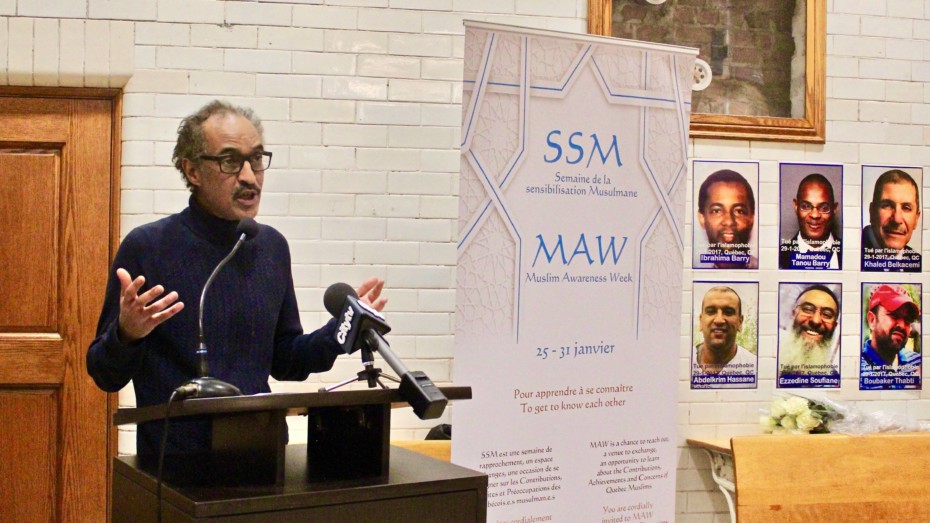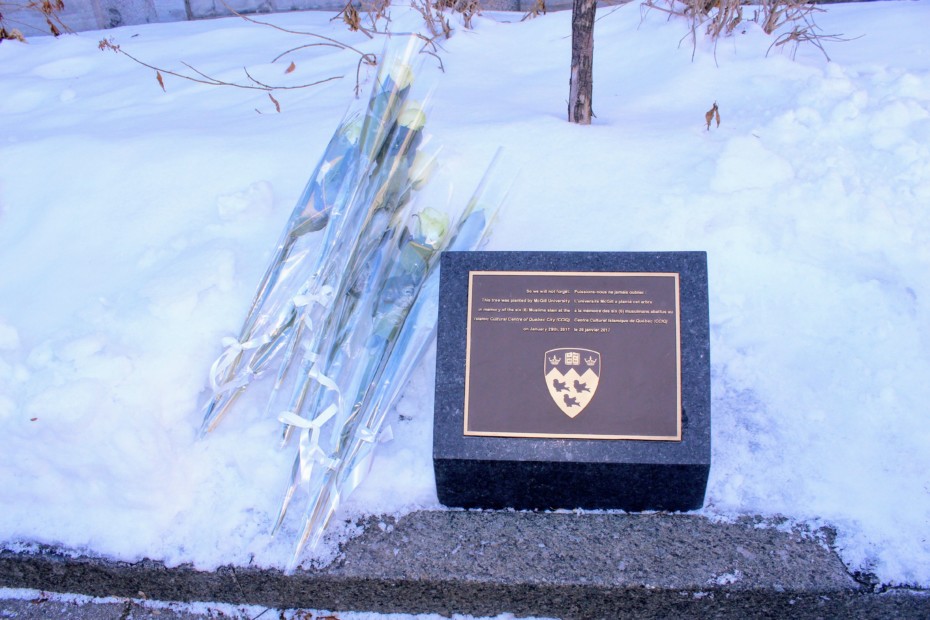
On January 29, members of the McGill and Montreal community gathered in the mezzanine of the Macdonald Engineering Building to honour the victims of the Islamic Cultural Centre of Quebec City (CCIQ) shooting. It marked the third anniversary of the tragic incident in which a lone gunman killed six men and injured numerous others following evening prayer at the mosque in the Sainte-Foy neighbourhood of Quebec City.
Speakers at the event included representatives from McGill administration, the professoriate and the student body, as well as Caroline Savic, representing Jennifer Maccarone, Member of the Quebec National Assembly for the riding of Westmount-Saint-Louis.
Hamza Lahmimsi, President of McGill’s Muslim Students Association, said that even now, three years after the attack, Muslims still are reeling.
“Our whole community was wounded by the loss of [our] beloved family. All Muslims were shaking at the realization that this could happen in a mosque. How can a community be at peace when the place that gives them the most peace is no longer safe?” he asked.
“The shooter was motivated by Islamophobic rhetoric. His intentions were terror. He wanted for us Muslims to live in fear, to be scared of the community we have loved for so long. His message was clear: You are not welcome here. It is becoming increasingly difficult to say whether he was right or wrong,” continued Lahmimsi. “The truth is it is a tragedy to even question whether you are guests in the country you were born and/or have lived in and contributed for so long.”
Diversity and inclusion win the day
Yesterday’s gathering was not remarkable for its size, but it was noteworthy for its diversity.
That diversity was not a slap in the face of the Islamophobia that spurred the attacker to commit such a heinous act. Instead, it was something far more powerful – a coming together of people from different countries and cultures, people with distinct backgrounds and beliefs – to honour the Muslim men who died that day, and to stand together in defiance of the hatred that sought, and still seeks, to drive people apart.
“As we remember [the victims], we also renew McGill’s profound and shared commitment to an inclusive campus wherein diversity is not merely tolerated, but welcomed and celebrated,” said Provost Christopher Manfredi. “Indeed, our university is home to people from all over the world. All identities, beliefs and experiences. Diversity in who we are enhances and nourishes McGill’s excellence.
“Although today is a day of deep sadness across Quebec and Canada, we will try to find comfort and strength as a community,” continued the Provost. “For this reason, I deeply appreciate our coming together today to mark this important moment as a gesture of remembrance and … a steadfast commitment to openness, belonging and inclusion.”
“The tragic events of January 29, 2017, cannot be allowed to be forgotten,” said Caroline Savic. “It is our duty to remember so that it will never happen again. It is an important reminder of the danger that awaits us when ignorance, fear and hatred take hold of people… I hope that this incident – tragic as it was – is a catalyst for an inclusive and united Quebec.”
Building bridges
Some speakers stressed that, while inclusion is an admirable goal, there must be concrete measures in place to achieve it. Ehab Lotayef, IT & Technical Services Manager, reminded people that the memorial ceremony was taking place during Muslim Awareness Week (MAW) – which he helped create two years ago in direct response to the shootings. MAW, said Lotayef is a way “to try and go beyond just compassionate sympathy… and take it to the level of trying to build bridges and connections and get the whole of society to learn more about Muslims – I hate to say it – as normal people who live in this province.”
Khalid Medani, Graduate Program Director at the Institute of Islamic Studies, reiterated this message, calling upon Muslim academics to make themselves more accessible – especially to the media – in an effort to clarify what it means to be a Muslim. Conversely, he implored the media to take more care in reflecting Muslims in fair and accurate ways that avoid negative stereotypes.
Medani also spoke of vigilance, both within the Muslim community and in a wider context.
“Vigilance is such an important aspect of dealing with these issues. I am speaking to the younger generation, of course, but also to the older generations to emphasize that we must have patience… but we also have to be vigilant,” he said. “Not only with respect to acts against Muslims, but against all different ethnicities, nationalities and races. It is only when we come together and are vigilant – understanding that this is really a national and global issue – that we can really begin to make some inroads in dealing with these types of issues.”
Flowers laid at memorial tree
Following the ceremony, the gathering was invited to walk to the east side of Dawson Hall to lay flowers at the foot of the CCIQ memorial tree – planted in 2018 – and plaque commemorating the victims of the shooting. One flower was laid for each of the men who died and a seventh was laid for Aymen Derbali who was paralyzed from the waist down during the attack.
The six men who were killed in the CCIQ attack were:
- Abdelkarim Hassane
- Azzeddine Soufiane
- Boubaker Tahabti
- Ibrahim Barry
- Khaled Belkacemi
- Mamadou Tanou Barry
As part of Muslim Awareness Week (running until January 31), there will be a screening of the documentary The Mosque: A Community’s Struggle on Thursday, January 30, from 6 to 8 pm, in Room 200 of New Chancellor Day Hall (3644 Peel Street). The film looks at the resilience of a community as it searches for hope in the wake of tragic loss.
On Friday, January 31, at 3 pm, McGill’s Institute of Islamic Studies presents the lecture Islamophobia as Racism – A Critical Phenomenology of Muslim Women’s Racialization in Morrice Hall (3485 McTavish Street), Room 17. Get more information on Muslim Awareness Week.

Neale McDevitt
